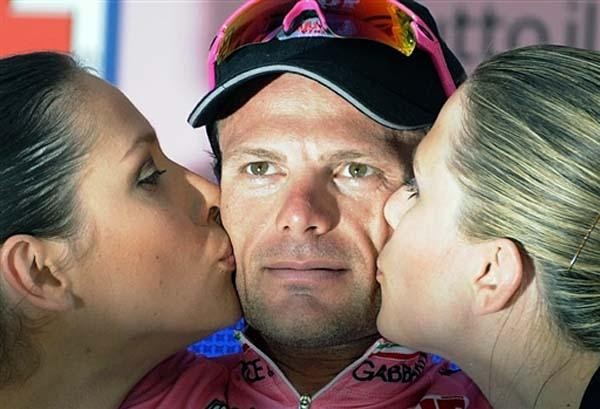UCI fines Di Luca 280,000 euros for his EPO CERA positive
New WADA rule allows hefty fines for dopers

UCI President Pat McQuaid confirmed that Danilo Di Luca will have to pay the UCI 70 percent of his 2009 salary following his positive doping test for EPO CERA during the 2009 Giro d'Italia.
Di Luca positive for CERA in Giro
Italian police raid homes of Di Luca and Santuccione
Third suspicious sample for Di Luca?
Di Luca's failed doping control confirmed
Di Luca to face CONI hearing on August 26
LPR Brakes fires Di Luca over doping charges
Di Luca claims conspiracy in doping positive
Di Luca facing three-year ban for doping
On Monday, the Italian Olympic Committee (CONI) banned Di Luca until July 21, 2011, and ruled that he has to pay 280,000 euros to the UCI.
Under the latest version of the World Anti-Doping Agency code, Anti-Doping Organisations such as international federations, can pursue financial sanctions. Under rule 326, the UCI has set the figure at 70 percent, if a professional rider is given a two-year ban for doping.
On Tuesday the UCI also announced that Italy’s Maurizio Biondo will have to pay 13,750 Euro and Spain’s Inigo Landaluze will have to pay 27,300 Euro after they were recently suspended for doping.
"I think it's a good thing. The UCI spends a huge amount on fighting doping and that takes money away from other parts of the sport. It's only right we can pursue riders to cover those costs," McQuaid said to Cyclingnews.
Di Luca has said he will appeal to the Court of Arbitration for Sport (CAS) against the two-year ban imposed by the Italian Olympic Committee. The UCI will have to wait for the outcome of that appeal, but McQuaid made it clear that Di Luca will not be allowed to race again, even if he serves his ban, unless he pays his 280,000-euro fine.
"Di Luca said he will appeal, but I can guarantee that we'll go to all lengths so that the fine is paid," McQuaid said to Cyclingnews.
Get The Leadout Newsletter
The latest race content, interviews, features, reviews and expert buying guides, direct to your inbox!
Alexandre Vinokourov and Michael Rasmussen both have hefty fines hanging over their heads from 2007. However both are currently allowed to race because the 70 percent rule was only recently introduced.
"Their cases are different," McQuaid pointed out. "They signed a commitment with the UCI, but claim it is not legally binding because they were pressured into signing it. They're allowed to race because they've appealed to the CAS and we're still awaiting judgment."
Di Luca is expected to appeal to the Court of Arbitration for Sport even before the CONI publishes its full verdict within the next 30 days. His lawyers have said that they question both the validity of the EPO CERA test carried at the Chatenay Malabry lab in Paris and the procedure followed during the tests.
Di Luca's lawyer Ernesto di Toni told Gazzetta dello Sport that both positives (taken the morning before stage 11 and stage 18) were "borderline" results.

Stephen is one of the most experienced member of the Cyclingnews team, having reported on professional cycling since 1994. He has been Head of News at Cyclingnews since 2022, before which he held the position of European editor since 2012 and previously worked for Reuters, Shift Active Media, and CyclingWeekly, among other publications.